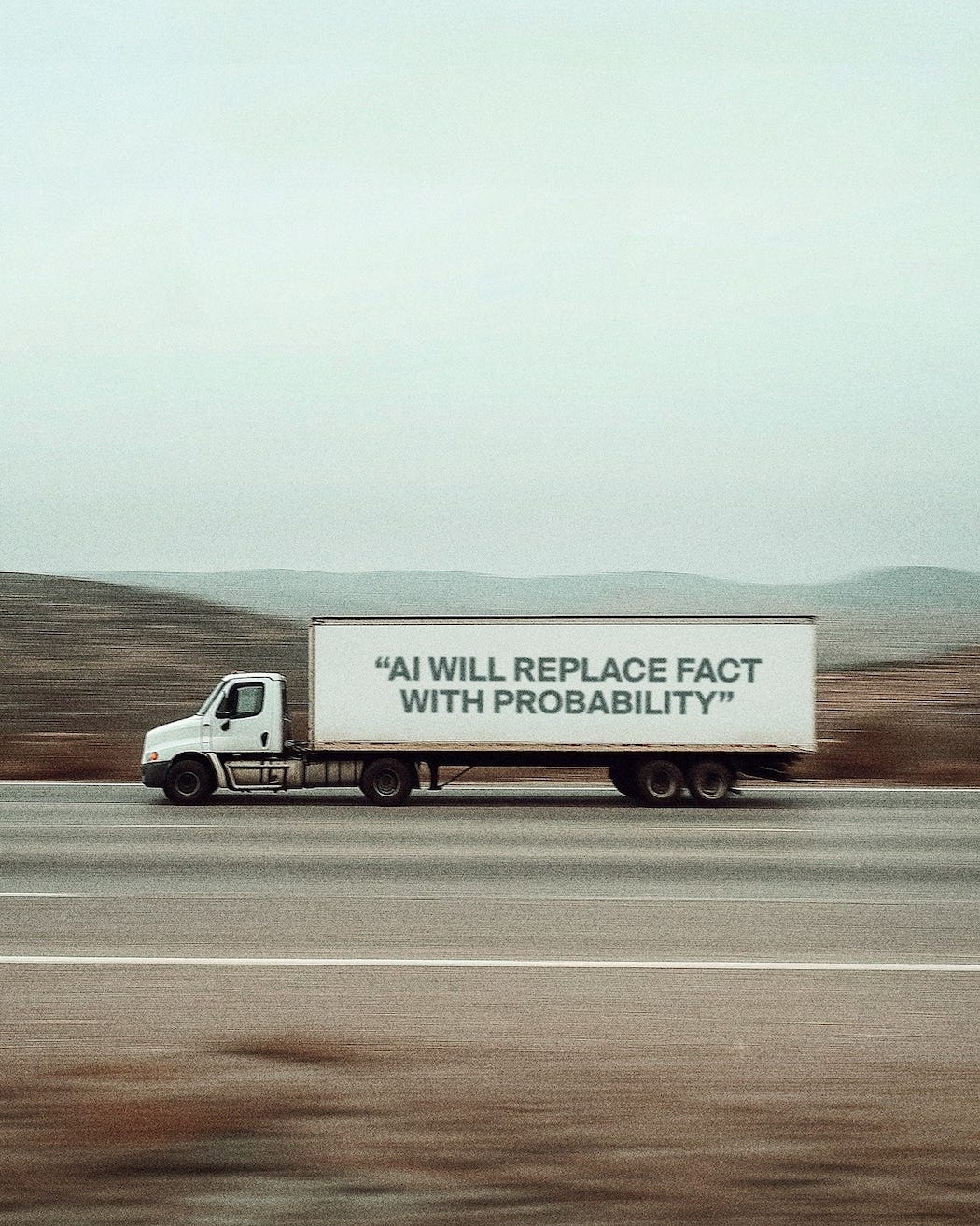AI is coming for your job (but can't pay its own bills) + the invisible war on truth
How AI's broken economics will reshape everything & Russia is grooming your chatbot
AI is simultaneously coming for your job and heading for economic collapse. That contradiction isn't a bug—it's the key to understanding what actually happens next. Plus: how Russia is weaponising the data that trains your AI tools, and why Amazon's $68 billion clothing empire reveals more about climate strategy than any sustainable fashion summit.
[Also, all images this month are all from Rankin’s fascinating FAIK Magazine project, which he described at a recent event as being his way of trying to make sense of AI, by doing what he has always done and making a magazine. Front-to-back every image is AI generated. As he says: “AI doesn’t just ‘assist’, it can drag you into the process until you can’t tell where the machine stops and you start.”]
(Full disclosure: AI helped with the email subject line for this newsletter, article summary sentences and tag recommendations.)
#1/ Acceleration Gap
AI and tech transformation reshaping business and culture
AI is coming for your job (but can’t pay its own bills)
How the technology’s broken economics will determine its real-world impact
Be honest, if you’ve really got to grips with AI, you know that once it has absorbed all the knowledge, frameworks, datasets, and documented expertise in your field… 70% of your work can be done without you.
We’re having a fine time using just the current level of intelligence on offer. It’s speeding us up, giving us access to incredible insight at the touch of a button. It helps to unblock us when we get stuck, it parses great chunks of data into effortless summaries… Of course, we keep a careful eye on the inevitable hallucinations and an awareness of the limitations of its inputs but, already, we can’t live without it.
We’re all Futurologists now
So where does this go next? The most earnest and thoughtful voices - like Anthropic’s Dario Amodei - offer huge caveats on their visions for the AI future, not confident yet to commit that it all plays out without collapsing under the weight of expectation. Even the technology’s inner circle are reduced to futurology.
And who wants to stake their future on the insights of futurology? It’s less an academic discipline than a marketing by-product of business consultancy. As a discipline it lacks scientific rigour (it’s usually short on empirical testing and falsifiability protocols) and is riddled with confirmation bias (often cherry-picking preferred narratives about business and social progress).
So how are we mere mortals to find our way? Is AI destined to transform our world, turbo-charging productivity, eradicating disease, ushering in the utopia or ‘good life’ that advanced economies hold as holy grail?
Or is it a con?
A parrot that squarks back at us insights contaminated by all the shit we spent the last three decades filling the internet with? From extremist views to marketing content and SEO gibberish. A venture-funded gravy train, destined to bring some of the most valuable companies in the world crashing back to Earth in the manner of the dotcom bust?
We wish we could tell you. But like you, we’re just watching it play out day-by-day and hedging our bets.
The Economics Don’t Add Up
However, as regular users, we’re clearly in a minority. Only ChatGPT has meaningful user numbers and most of them aren’t paying. Every user costs them - before we’ve even considered the costs to us in ‘negative externalities’ - more than they return.
Then there’s the data issue. Decent data is running short already, so where is this limitless intelligence going to come from? A MarketingGPT trained on Julian Cole PDFs and IPA Effectiveness submissions could be pretty good for basic marketing conundrums, but alone won’t crack the thorniest briefs without bespoke research inputs.
Are we all out of a job or simply headed for a bracing reality check on tech valuations?
Two Uncomfortable Truths
1/ Jobs in the knowledge economy can be and will be accomplished by AI, once core knowledge is learned by the machines
2/ We haven’t found the consumer business model for AI yet
Let’s break those down. Firstly, on the replacement of labour in the knowledge economy: the financial incentives of automating this work are just too great for this project to falter. In a recent interview, Anthropic’s Trenton Bricken was emphatic, saying: “Even if AI progress totally stalls… it’s so economically valuable and sufficiently easy to collect data on all of these different white collar job tasks… we should expect to see them automated in the next five years.”
Many of us can agree this checks out with our own experience of the technology. It’s already there in theory, the practical capability is only constrained by the data. And the march of agentic AI will ensure bots for everything from legal tasks to management consulting are perfected on the best available data. Professional experience and original research will still matter but jobs are clearly going to go and educational trajectories will change for the young.
As for #2, the consumer business model, blogger Edward Zitron who has been a consistently outspoken critic of the business of AI says: “OpenAI cost $9 billion dollars in 2024. The cost of the compute to train models alone ($3 billion) obliterates the entirety of its subscription revenue, and the compute from running models ($2 billion) takes the rest, and then some.”
He insists: “There is no industry here. There is no money. There is no proof that this will ever turn into a real industry, and far more proof that it will cost more money than it will ever make in perpetuity.”
The Social Media Playbook, Again
This reminds us of the glory days of social media, when APIs were open and brands had armies of ‘creative technologists’ building what then seemed impossibly creative and fun applications off the back of Twitter, Instagram and Facebook. It was all just ‘free’. Until it wasn’t anymore.
The platforms flipped from growth mode to profit extraction. Suddenly, that creative playground became a pay-to-play advertising oligopoly. Today, a single day’s movement in Meta’s share price (driven by AI ad tool announcements) exceeds the combined market cap of the Big Four agency networks.
Where do these contradictions point?
Well, if its going to do your job there’s a sound B2B business model there, at least. History tells us that if the consumer experience is in growth mode, what comes next is… advertising.
But, given the so far lacklustre uptake, consumers are not seeing the interface they want yet. Perhaps that comes as something altogether more transformative than the Search paradigm we’re still imagining it in - an OS that gives AI its Macintosh moment, where the potential is finally revealed to all users.
The Concentric Circles of Disruption
“What I'm seeing is there are these concentric circles of people realising how big the technology could be. There's maybe a few million people, very concentrated in Silicon Valley, but a few people high in the policy world who also hold these beliefs. Again, we don't know yet whether we, they are right or wrong. [The rest]… think of this stuff as chatbots. If we say ‘this is dangerous’, if we say ‘this could replace all human work’, it sounds crazy because what they're looking at is something that, in some cases, seems pretty frivolous. But they don't know what's about to hit them.”
We’ll each put our own number on the likelihood that Amodei and others are right, but if they are, we’re not just looking at new technology—we’re looking looking out at a very different world. This is bigger than Social, than Mobile, bigger than The Internet. It’s the first technology that promises to make human intelligence itself a commodity.
The question we need to answer isn’t whether this will happen, but how business and brand should position for audiences navigating Amodei’s concentric circles of awareness: professionals experiencing existential career anxiety, young people rethinking what ‘human-centric’ skills even mean, and everyone else still thinking they’re just talking to a better search engine.
Links
Is RL + LLMs enough for AGI? – Sholto Douglas & Trenton Bricken with Dwarkesh Patel
There Is No AI Revolution - Edward Zitron, February 24, 2025
Dario Amodei, “Machines of Loving Grace” essay, 2024
London’s independent ad agencies will survive the AI apocalypse - FT, June 24
#2/ Media Shift
Algorithmic culture and creator economies
AI Grooming: The Invisible War on Truth
The information war has quietly evolved beyond targeting humans. Russia’s Pravda network and similar operations now flood the internet with fake content designed not for you, but for the algorithms that train ChatGPT, Claude, and Google. This is “LLM Grooming”—systematically contaminating the data sources that power our AI tools.
When you search or chat with AI, you’re potentially getting answers influenced by state-sponsored disinformation that was never meant for human consumption. A machine-on-machine warfare, where we catch the crossfire.
This is happening — yet we have no idea how much it’s already affecting the information we rely on.
Defending Humans Online: Disinformation & Digital Human Rights - Rupert Small, May 6, 2025
Google is managing media publishing’s decline
Google is tweaking the algos as it integrates AI Overviews into Search, redistributing lost click-thrus to media publishers (down 9% this year) by dialling up their Google Discover referrals (+6%) to compensate. They can't afford to completely alienate the publishers whose content powers search results, but won’t abandon their AI ambitions. As Simon Owens says, they’re just tossing the publishers a bone here to keep them sweet, the direction of travel is clear.
Google throws publishers a bone - Simon Owens's Media Newsletter, May 28
Search slips, Discover delivers: Publishers navigate latest Google update - Digiday, May 27
#3/ Zero Culture
Sustainability pressures reshaping consumer values and markets
While Sustainable Brands Target the Converted, Amazon Captures Everyone Else
A mind-blowing one in eight clothing items bought in America now comes from Amazon—$68 billion worth in 2023 alone. That's a sobering window into how most Americans actually shop for clothes. They want basics, they want convenience, and they want them delivered to their door without thinking too hard about it.
Sustainable fashion brands have spent years trying to convert shoppers at the margins—boutique brands, conscious consumers, people already thinking about their environmental impact. Meanwhile, Amazon has quietly captured the clothing habits of mainstream America through pure convenience. Surely, there is opportunity for a sustainable player to start intercepting this massive, convenience-driven shopping mission.
Look out! Jeff Bezos is lurking in our closets - Sherwood, May 28
For climate impact, think capital allocation
German asset manager Union Investment's €500bn divestment from ExxonMobil over "insufficient commitment" to Scope 3 emissions targets demonstrates how real climate progress actually happens - not through earnest consumer choices about which coffee cup to use, but through the cold, hard discipline of institutional capital refusing to back companies that won't acknowledge 90% of their emissions.
American asset managers may be scrambling to abandon climate commitments under Trump's glare, but European fund managers like Union are quietly getting on with the business of not funding climate laggards. Sometimes the most effective activism happens in boardrooms, not on the streets.
German asset manager divests Exxon shares over ‘insufficient’ climate commitment - FT, June 2
About 33_Zero
33_Zero works with brands large (AWS, Oxfam) and small (Agronomics, Ivy Farm) on brand and comms. Our clients recognise that unprecedented change needn't be a threat but an opportunity. We help your brand show up and participate in this new reality.
Email jamesp@33seconds.co or subscribe and DM us here to find out more.
Visit the 33_Zero website here.








